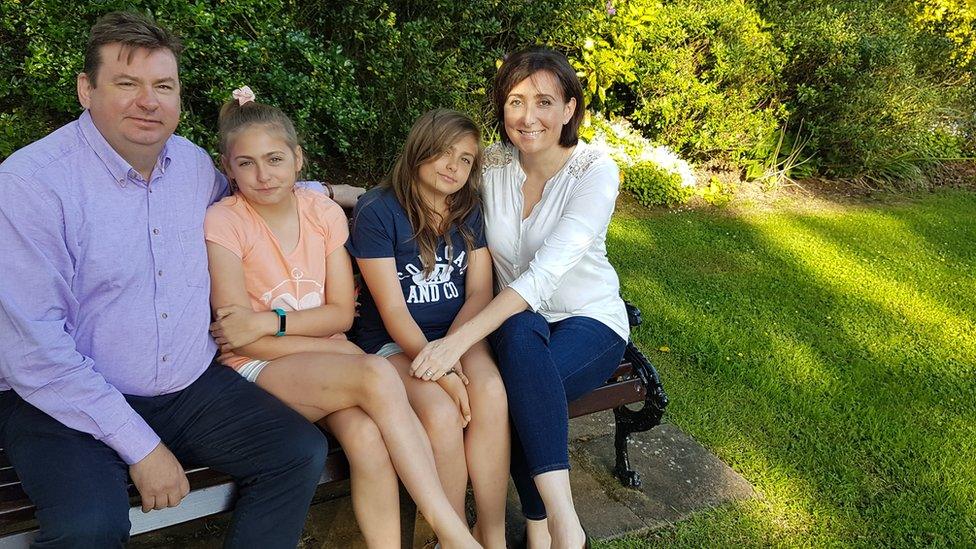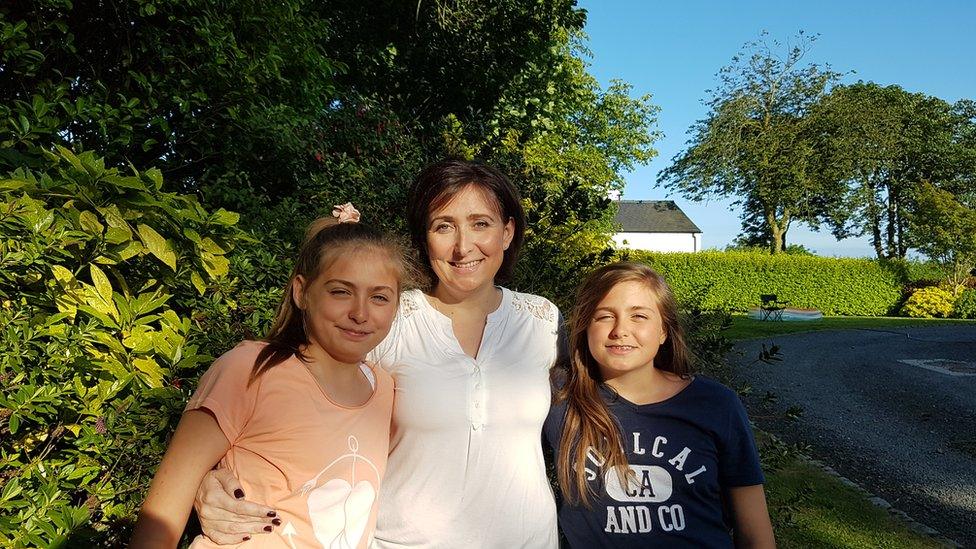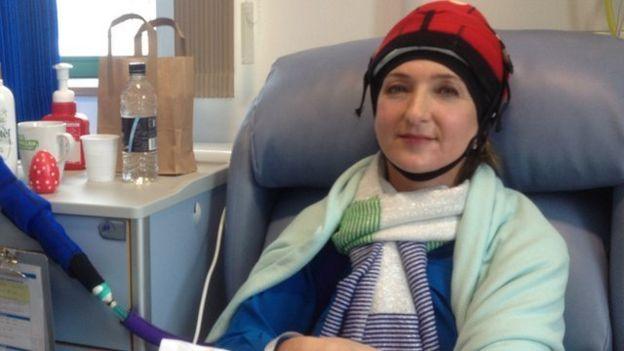Cancer patient hits out at lack of scalp cooling in NI
- Published

Claire McQuillan, with husband Martin and twin girls Sophie and Elizabeth
A Belfast woman who is facing chemotherapy for a second time after her breast cancer returned has been told a "cold cap" is not an option.
"Cold caps" or "scalp cooling" can prevent or lessen hair loss which occurs during chemotherapy.
It is offered in more than 250 hospitals in the rest of the UK but not Northern Ireland.
The health board said the "clinical and cost effectiveness" is not sufficient for them to be used.
'Really upset'
"The Health and Social Care Board (HSCNI) will, as commissioner, reassess this position if new or emerging evidence becomes available," it added.
Scalp cooling can only be used with certain drugs. According to leading cancer specialist Royal Marsden Hospital's website "success depends on the dose of drug and whether other drugs are given at the same time"., external
The procedure uses a cold cap to lower the temperature of the top of your head. The cold narrows the blood vessels and prevents the drug passing into the cells at your hair root and damaging them.
Watch more on how a cold cap works.
Claire McQuillan, 42, a patient at the Ulster Hospital, had a recurrence of cancer in April and wanted to use a scalp cooling treatment, but was told it was not available.
"I was really upset when I found out it wouldn't be an option for me", she said.
Claire lives with her husband Martin and twin girls Sophie and Elizabeth (11).

Claire's daughters Elizabeth and Sophie found it very difficult when their mum lost her hair the first time
Having only recently grown back her hair after her last chemotherapy, the prospect of losing her hair again is difficult for Claire but also "extremely upsetting for my children".
"As a woman you know how important your hair is to you, and when my hair re-grew, I felt I was getting better.
"Most importantly, I have two daughters who are at a sensitive age.
"It makes things so much easier for them as they associate me having hair with me being better.
"With work, you want to get back and meet clients and not feel self-conscious. I don't want people looking at me - I wore a wig last time and found it uncomfortable".
'Significant implications'
Her sister, Carolyn, who subsequently set up the awareness group, Chilled Chemo, discovered the process was not available in Northern Ireland.
A company also offered to provide the service for her for free on a trial basis, which was not accepted, she said.
Claire, who has now started her second round of chemotherapy at the Ulster Hospital, on the outskirts of Belfast, praised staff and said she understood the health board are "prioritising the bigger picture".
She also accepted concerns about the size of the facilities.
"However, it does raise the question why hospitals across the UK can offer scalp cooling and a major city like Belfast is not equipped to offer the service," she added.
"Even if it isn't for everybody, they should still have the option."
The South Eastern Health Trust said: "The use of the equipment has significant implications for chair time (which is where patients receive their chemotherapy treatments) which impacts on the capacity to treat all patients requiring chemotherapy regimens within the MacDermott Unit in the Ulster Hospital and across all the trusts in Northern Ireland.
"Until this service is commissioned, the trust is not in a position to provide this service."

Cancer and hair loss
The effect of cancer drugs can range from mild thinning of the hair, partial or complete hair loss. Some do not cause any hair loss at all, including certain chemotherapy drugs.
Hair loss can be affected by the dose of drugs taken and an individual's sensitivity to them.
Patients are advised to plan for potential hair loss, including whether they might wish to wear a wig, before treatment begins.
If hair does fall out, it usually begins two to three weeks after treatment starts and takes place gradually.
After chemotherapy, hair may take several months to grow back and is likely to be softer.
Source: Cancer Research UK, external

The Taunton and Somerset NHS website says the system "is not suitable for all patients who will lose their hair with chemotherapy: it depends on the type of chemotherapy drugs being given and other patient factors"., external
'Uptake low'
In 2010, Altnagelvin Hospital in Londonderry introduced 12 scalp coolers with the help of cancer charity, Walk the Walk.
A spokesperson for the Western Health Trust said: The uptake for scalp cooling was very low.
"The equipment had not been used for a number of years and was still financially supported by charitable funding.
"It was felt inappropriate to retain the equipment and funding when it could possibly be utilised elsewhere in the UK, therefore machines were returned in 2017".
BBC presenters, Rachael Bland and Victoria Derbyshire have both written about their experience of using cold caps during chemotherapy.

BBC presenter Victoria Derbyshire used a cold cap as part of her cancer treatment
The HSCNI statement said: "Within Northern Ireland, a comprehensive range of cancer treatments and supportive therapies are provided.
"For those who experience hair loss as a consequence of cancer treatment, wigs and hair pieces are available.
"In 2012, the Northern Ireland Cancer Network considered the potential role of cold caps in preventing hair loss during chemotherapy treatment.
"At that time, the network advised that the evidence on the clinical and cost effectiveness of cold caps was not sufficient for this service to be routinely commissioned.
"The Health and Social Care Board will, as commissioner, reassess this position if new or emerging evidence becomes available."
- Published9 November 2010